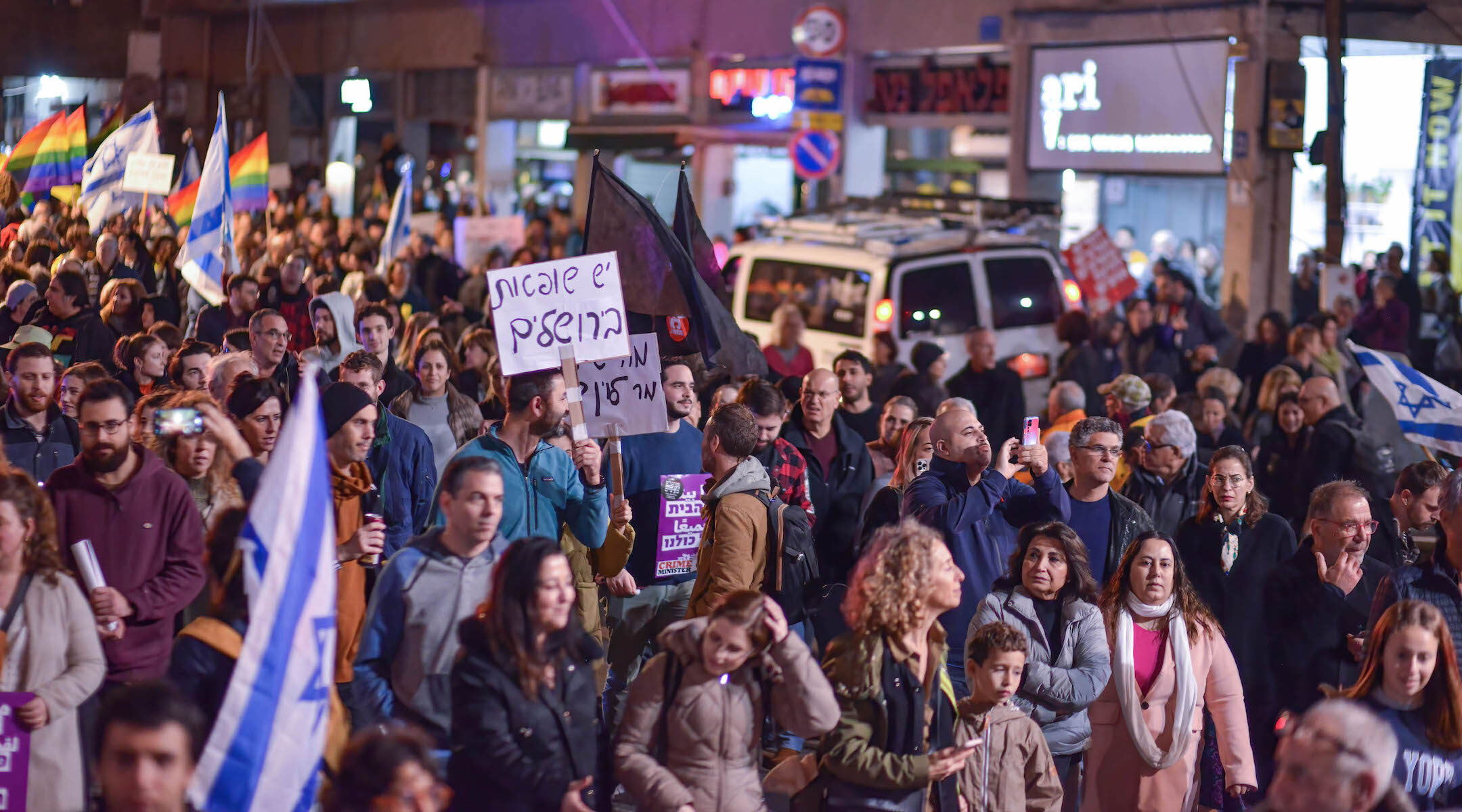(JTA) – As Israel’s new right-wing government continued to signal that it would push through measures to cripple the judiciary and clamp down on public dissent and news operations, thousands of citizens took to the streets in protest and one prominent opposition figure warned of imminent “civil war.”
A reported 10,000 demonstrators gathered Saturday night in Tel Aviv to protest against Prime Minister Benjamin Netanyahu’s new right-wing government, which contains several ministers who are openly hostile to Arabs and Palestinians, LGBTQ people and liberal forms of Jewry. Organizers, many of whom hailed from Israeli left-wing groups, advertised the demonstration as “against the coup d’etat carried out by the criminal government which threatens to harm all citizens whoever they are,” according to the Times of Israel.
Many of them directed their ire toward the proposed legislation that would allow the Knesset, Israel’s parliament, to overrule decisions by the Supreme Court. Some carried signs comparing Netanyahu and his coalition to Nazis. Others used the rallying cry “Crime Minister,” referring to Netanyahu’s ongoing corruption trial.
Counter-protesters were present as well. At least one anti-Netanyahu lawmaker who attended the protest, the Israeli Arab Knesset head of the Hadash Ta’al party Aymen Odeh, was assaulted, according to video of the event, and police are investigating.
Netanyahu and his allies decried the protests, with the prime minister condemning the Nazi comparisons and displays of the Palestinian flag. “This is wild incitement that went uncondemned by the opposition or the mainstream media,” he tweeted on Sunday. “I demand that everyone stop this immediately.”
Another protest was set for Thursday, this time by attorneys who are planning a walkout to register their disapproval of the proposed judiciary changes. But government ministers have offered no indication that they are considering the views of Israel’s left, instead pressing forward with a raft of right-wing proposals. In recent days:
- Public security minister Itamar Ben-Gvir ordered Israeli police to remove Palestinian flags from all public places, apparently incensed by the sight over the weekend of an Arab town waving the flags to celebrate the release from prison of a local who served 40 years in prison for killing a soldier in 1980. Ben-Gvir said the Palestinian flag “is a form of supporting terror.” Displaying the flag is legal in Israel but frequently challenged nonetheless.
- Israel’s new communications minister, Shlomo Karhi, told an Israeli university that “there is no room in this age for public broadcasting,” and said the country’s publicly funded news organization, Kan, was trying to “police the conversation.” Karhi, a member of Netanyahu’s Likud party, has previously stated his desire to end public funding to Kan and other Israeli public broadcasters, accusing them of being too left-wing. A crackdown could interfere with Israel’s participation in the Eurovision song contest, which recently warned Netanyahu against threatening public broadcasting.
- The government is also set to fast-track a bill that would revoke the citizenship or residency from people who are convicted of terrorism who receive payments from the Palestinian Authority. The move is seen as a step toward ejecting “disloyal” Arabs from Israel, something that Ben-Gvir has said should happen. When an Arab lawmaker questioned why the legislation does not apply to Jewish terrorists who are supported by extremist groups, one Knesset member from Netanyahu’s party said,“In the Jewish state, I prefer Jews over disloyal Arabs. We’ve stopped apologizing for it.”
- Finance Minister Bezalel Smotrich over the weekend blocked millions in tax revenue from reaching the Palestinian Authority and redirected the funds to families of terror victims instead, a reported punitive measure to punish the Palestinians for pushing the United Nations to deliver a judgment on Israel’s actions in the occupied West Bank. The PA’s prime minister, Mohammad Shtayyeh, told Haaretz that such a move could lead to the “collapse” of the authority, an outcome Smotrich seemed to welcome at a press conference: “As long as the Palestinian Authority encourages terror and is an enemy, I have no interest for it to continue to exist.” Most analysts see the Palestinian Authority, for all of its faults, as a bulwark against more extreme groups taking charge in the West Bank.
It is not yet clear whether the moves will turn into policy or whether they represent a flurry of proposals and posturing as parties stake out their positions at the start of a new government. But either way, tensions are flaring. Former defense minister and chief Netanyahu rival Benny Gantz said that Netanyahu was spurring on a “civil war in Israeli society” and called on protestors to keep up their pressure; the prime minister in turn accused Gantz of leading “a call to sedition.”
At least one proposal by members of the new government appears to have already hit a snag. Lawmakers in a haredi Orthodox party said they wanted railway maintenance to cease on Shabbat, and Netanyahu reportedly backed their demand. But on Thursday, the transportation minister, a member of Netanyahu’s party, rebuffed the demand.
JTA has documented Jewish history in real-time for over a century. Keep our journalism strong by joining us in supporting independent, award-winning reporting.






